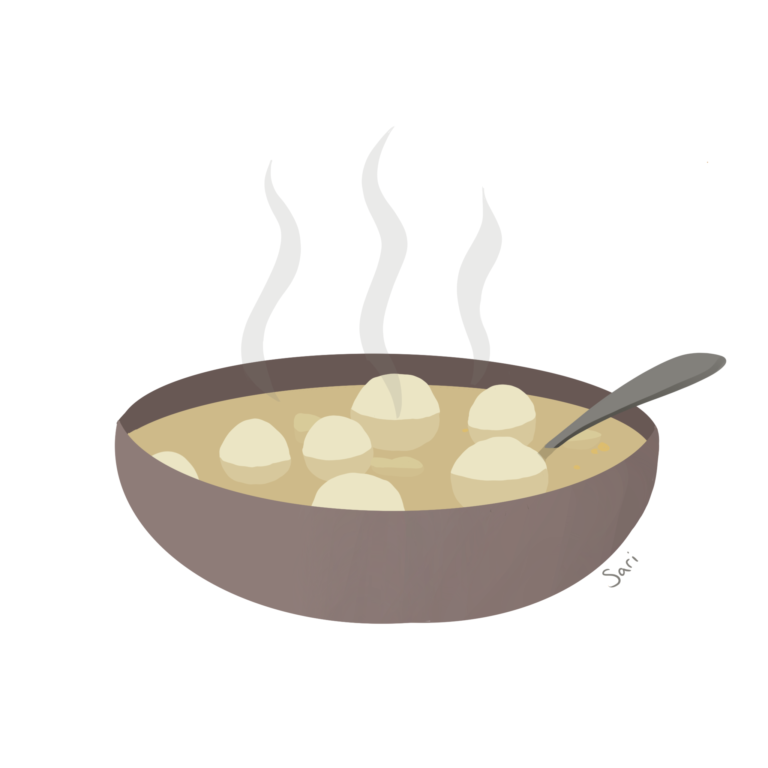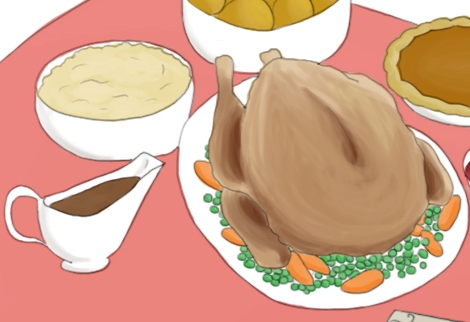
This year was my brother’s twentieth yahrzeit. It’s hard to believe he’s been gone that long. He was 26 when he died, and it’s sad that I can’t imagine him at 46.
My mother’s yahrzeit is a month after my brother’s, on erev Chanukah. It’s been nine years since my mother died, and she’s missed so many important events in my life, including my wedding.
Food is a sensual experience; we taste it, we smell it, we touch it, we labor over its creation, and we relish its consumption. Food not only helps me relive memories of my loved ones, but it connects others to them as well.
In addition to giving tzedaka, my husband and I were discussing what to do to mark their yahrzeits. My brother was a drummer in high school, so we donated a drum set to a local day school, in hopes that it would spark something in one of their students, as it had in my brother. This was meaningful for me in a larger sense, but I was still searching for something which would really make me feel connected to the people I love who are no longer here.
I think about my mother and brother often, I tell stories about them, I have artwork in my home that my brother created, I wear a beautiful necklace that has my mom’s diamond in it…but these are not things which transcend everyday life and make me feel like I am connected to them, sharing some sort of experience with them. So, what does?
For me, and many others, it’s food.
Food is a sensual experience; we taste it, we smell it, we touch it, we labor over its creation, and we relish its consumption. Food not only helps me relive memories of my loved ones, but it connects others to them as well.
For my brother, it’s lemon yogurt with chocolate chips. When he was in elementary school, he was a picky eater, but he loved to have lemon yogurt with mini-chocolate chips poured on top. He ate that for lunch most days. When I think of this memory, I feel closer to him, but if I really need a dose of Michael, I’ll eat lemon yogurt with chocolate chips.
As for my mother, there are lots of foods which make me feel connected to her. Growing up, she made matzah balls only during Pesach (I know, for lots of you, that’s the one time of year you don’t make them!). Hers were the rock-solid kind, made with hand-crushed matzah. I loved them. As a young adult, she taught me how to make them, and was even jealous when mine worked the first time (they floated, instead of breaking apart and needing more matzah meal).
I have such loving memories of making matzah balls with my mom, and when I make them now on my own, I’m transported back to being in her kitchen, cooking with her. It’s an experience that only making food can offer. Her matzah balls are so loved within our family that my cousin recently asked for her recipe so she could make them for her daughter.
Food even has the power to connect us to people we never knew.
I also feel connected to my mom during Thanksgiving. When I became a ba’al teshuva, my mother was extremely supportive, and would help make a kosher meal for me whenever we were together. One Thanksgiving, we cooked a kosher turkey which she bought. She was shocked at how expensive kosher turkeys were, having only ever purchased non-kosher turkeys her whole life, but she did it for me.
Then came the task of cooking a heavy turkey in a disposable tin pan. Have you ever tried to lift a flimsy pan holding a huge, heavy bird? Not an easy task. We looked like we were reenacting a scene from I Love Lucy where Lucy and Ethel are fumbling over everything they touch in the kitchen. The turkey almost wound up on the floor, and we had something to laugh about for years to come. I remember this experience every year when I make a turkey for Thanksgiving.
I even feel connected to my mother by foods she didn’t eat. My mother hosted Thanksgiving often when I was growing up, but we never had gravy with the turkey. We weren’t a religious family, but one that identified as Jewish, and somehow, in my mind, the fact that we didn’t have gravy meant that Jews didn’t eat gravy, like Jews don’t eat white bread or Cheetos. So the first time I had a dinner party where I served a turkey, my guests—many of whom were Jewish—asked for the gravy. Shocked, I responded that “Jews don’t eat gravy”. How could they not know this??
“What?!” they asked. “What kind of crazy idea is that?”

That’s when I learned that it’s not Jews who don’t eat gravy; it was just my mom! Now I just serve the turkey drippings, because it feels disloyal to make gravy.
Food even has the power to connect us to people we never knew. I have a friend, Sara, who I’ve known for over 20 years. When I first met her, she had a bottle of Kedem raspberry syrup on her Shabbos table. I believe it’s meant to be mixed with seltzer to make a soda, but she introduced it as Bobi (bubbie) Leser Tea. Her bobi added it to hot water to make a raspberry-flavored tea. From that time on, whenever I see it in the store, or on someone’s table, I always smile and say, “Oh, Bobi Leser Tea!” I’m connected to my friend, and her grandmother, who I’ve never even met (in fact, I don’t think I’ve ever even seen a picture of her!).
I’m also connected to this same friend and her mother through their yapsuk. During Pesach, when you can’t use grains like barley, people often make a cholent using just potatoes and meat. Like a potato kugel, but with meat mixed in. Sara’s mother makes one that’s like heaven in a dish! I make sure to invite myself to her house for Shabbos Pesach to get some. This keeps me connected to her mother—a lovely woman—who I get to see a few times a year, especially around the holidays. She should live and be well until 120, but long after she’s gone, I’ll still be talking about her yapsuk.
I’m sure each of us has special memories of a food which connects us to a loved one. The nice thing about food is that you can make a dish any time you want to feel that special connection…so I’m going to run out now to get some lemon yogurt with chocolate chips.